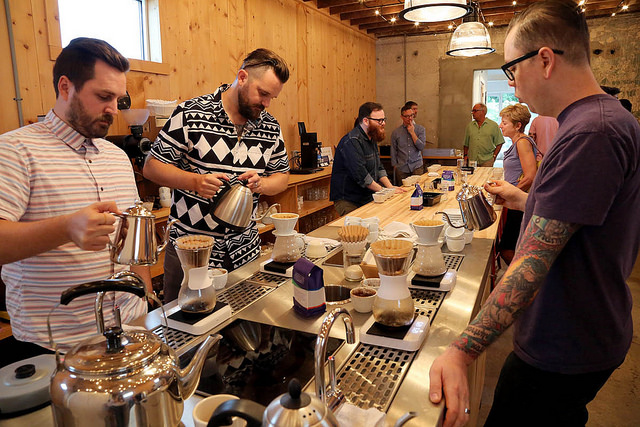
Counter Culture Coffee
by Jeffrey Slater, {grow} Community Member
Of all the marketing strategies that professionals will embrace in 2016, I believe teaching and education will rise in prominence. Educational marketing isn’t well-understood, but it is actually quite simple. When you are helpful and provide knowledge to current and potential customers, you are building depth and emotional bonds for your brand.
Educational marketing means you are providing wisdom and insight to customers to help them do their jobs. Typically you do this in a non-commercial framework.
Do you remember a wonderful teacher who inspired you? Did they help guide you through complex and fascinating subjects? Teaching creates strong emotional connections. For marketers in 2016, I see a teaching framework as a lens to view our work.
The following are three examples demonstrating the ways that solopreneurs, small businesses, and larger companies are using education as a fundamental marketing strategy.
Three Examples
1. The Exchange
Five years ago, I was looking for a way to reach marketing decision makers in the wine industry. I could have chosen many different tactics to communicate key messages to them about our products including traditional trade advertising. Instead, we decided to organize a live event that would bring together fascinating speakers, great conversation, and a platform for a free exchange of ideas.
We brought in authors like Gary Vaynerchuk, Robert Scoble and Mark Schaefer to educate and inform our audience. We organized panel conversations made up of folks who are important customers for our customers, like master sommeliers and wine educators from Whole Foods, Safeway, and Spec’s Finer Foods. Important industry thought leaders like Stephanie Gallo, Carolyn Wente, and Jean-Charles Boisset also spoke at our conference presenting their views on the state of wine marketing. We filtered every decision we made for our conference from an educator’s perspective. Let’s teach or share something of value and earn the trust and respect of industry colleagues.
We created a place for marketing professionals to connect, network, and discuss some of the pressing marketing topics of the day. In short, we positioned ourselves as facilitating education. We called our event The Exchange, and it continues as a teaching platform for the wine marketing community. Everyone goes home with a wonderful book as our gift, and we are helping to bring insights, ideas, and inspiration to our industry. In the coming year, we will expand this platform to Europe to help bring help to global marketing professionals.
2. Udemy
Solopreneurs looking for a new revenue stream are heading to Udemy, the online teaching platform with over nine million students and over thirty-five thousand courses. Taking your content and packaging it into a class is quickly becoming a part of how small business owners are earning income through education. Can you teach someone how to code, bake sourdough bread, or use advanced templates in Photoshop?
By becoming an educator, you are harnessing the ability to bring new, highly-targeted customers into your community. Whether at list price, discounted through coupons or free, Udemy has people taking courses in everything from coding to cooking cod – from teaching yoga to making homemade yogurt. They not only help you teach with a simple to use platform, but they bring customers to you through their own highly targeted Facebook advertising and discount coupon system. (Think Groupon meets a MOOC- massive open online class). Could teaching a class help you make some money and build deeper bonds with existing clients? Even open the door for new business?
My daughter Fanny, who won The Rachael Ray Great American Cookbook Competition, has a cookbook available for sale in March 2016, Oranges, Lavender & Figs. She is preparing to teach a class through Udemy to help extend her brand and to create a new income stream. It is the perfect platform for small business owners to attract new clients for other services like her food writing, recipe development and other bespoke food-related services. She is even pitching some companies to pay her to teach a course in how to use their products properly.
3. Counter Culture Coffee
Counter Culture Coffee is a Durham, North Carolina company that imports and roasts exceptional fine coffees. They sell their beans to coffee shops in select markets. In every place they sell, they set up teaching academies for both consumers and the trade, who learn the proper techniques for making sensational coffee products.
Their classrooms are their marketing in each city; they believe that educational marketing can help develop consumers who appreciate what they brew, but it also helps train new retailers, the backbone of their business. Want to open a coffee shop? Take a class, learn from Counter Culture Coffee, and become a certified expert in the coffee arts. The more they can educate their customers, the deeper the bonds and the more powerful the connection to the Counter Culture Coffee brand.
How Will Education Play a Role in Your Marketing in 2016?
There are unlimited tactical approaches to an educational strategy. You can turn your training into online webinars that emphasize learning not selling. Companies are finding that giving away knowledge is a door opener to build a deeper connections and to help train potential customers on critical points of difference. Self-publishing books or eBook allows you to position yourself or your company as an educator or thought leader too. Meetups in local markets provide opportunities to teach a live class to an interested audience of potential customers.
What will you teach in 2016 and how will an educational framework help you grow your brand?
 Jeffrey Slater is currently Global Director of Marketing for Nomacorc, the leading wine closure company. He blogs at The Marketing Sage and provides helpful marketing advice, consulting and coaching. He is the author of Unraveling the Mysteries of Marketing. Earlier in his career with his wife, he built Rachel’s Brownies, one of INC Magazine’s fastest growing companies in the 1980’s.
Jeffrey Slater is currently Global Director of Marketing for Nomacorc, the leading wine closure company. He blogs at The Marketing Sage and provides helpful marketing advice, consulting and coaching. He is the author of Unraveling the Mysteries of Marketing. Earlier in his career with his wife, he built Rachel’s Brownies, one of INC Magazine’s fastest growing companies in the 1980’s.
Featured image by Counter Culture Coffee via Flickr CC


